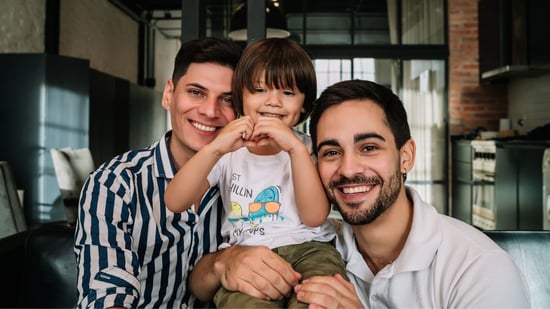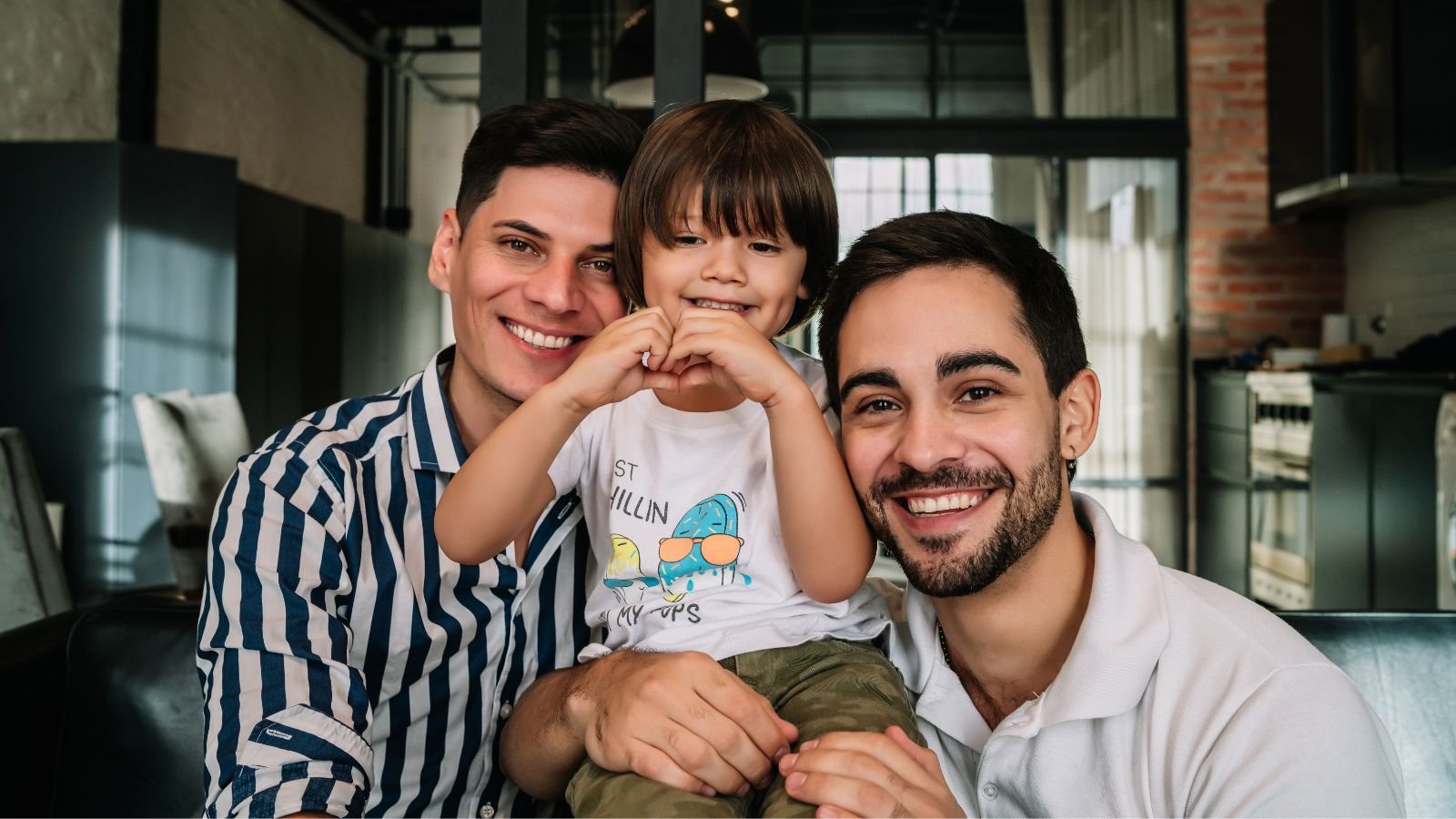5 Questions We Should Stop Asking LGBTQ+ Parents
December 2nd, 2024 | 7 min. read


June is the perfect time to reflect on how we’re doing with making LGBTQ+ parents feel welcomed in social situations. Whether you’re an ally or part of the rainbow community, there’s always more to think about, learn, and un-learn when it comes to treating queer families with respect.
Skip to a section:
- Stop Asking LGBTQ+ Parents These 5 Questions
- “Which one of you is the real mother/father/parent?”
- “Did you use a surrogate or do IVF?”
- “Are you worried they won’t have a male/female role model without a father/mother?”
- “How much did it cost for you to have a baby?”
- “When are you going to tell your child the truth about their birth?”
- Questions to Start Asking LGBTQ+ Parents
- More Resources for LGBTQ+ Parenthood
Stop Asking LGBTQ+ Parents These 5 Questions
A good place to start is to consider what you should (and shouldn't) be asking LGBTQ+ parents or parents-to-be. Here are five common questions to stop asking LGBTQ+ parents - and what you should think about asking them instead!
1. “Which one of you is the real mother/father/parent?”
While this question often stems from simple curiosity, it’s actually looking for an extremely personal answer. What you’re really asking is an explanation of whose sperm and/or egg was used in creating this family’s child. Pretty personal, right?
Jennifer Tharrington, Adoption and Assisted Reproduction Attorney, discusses this question in her post, “Things Not to Ask Same-Sex Parents.” To avoid appearing and being invasive, Tharrington recommends that with questions like this, we should “run that through the ‘would I ask a heterosexual person this question’ test.” If you’ve never asked a cis/straight presenting couple this question, or wouldn’t think to do so, you can apply the same logic to any parents.
2. “Did you use a surrogate or do IVF?”
Let’s unpack this question and explain why it’s inappropriate and inherently transphobic. There’s a fascination with queer parents creating children that’s a huge double standard – people often feel entitled to information based on assumptions they make about a person’s reproductive status. We don’t feel the same entitlement when it comes to heterosexual-presenting couples, which means (refer to the first question) we have a problem.
For example, when someone sees a couple they perceive as being both men, they assume they both have male sex reproductive systems (assigned male at birth, or AMAB). So one could jump to the conclusion that in order to have a biological child, they’d need a donor egg and a gestational carrier, or surrogate.
But by making an intrinsic connection between sex and gender, we’re not allowing space for trans people to be normal parents, just like everyone else. A good rule of thumb? Never make assumptions!
Want to learn more about trans fertility?
3. “Are you worried they won’t have a male/female role model without a father/mother?”
This question is socially and scientifically dated. Firstly, it comes from the idea that children need a parent of “both” genders — which subscribes to the trans-excluding theory of a strict gender binary. As a non-binary person, I’m often tempted to interject: “Are you worried your child won’t have an enby role model, without a non-binary parent?”
Also, we now have scientific proof that children’s mental health, overall happiness, and resiliency don’t rely on having parents of specific genders, sexualities, or romantic orientations. In 2018, a 30-year study was published in the New England Journal of Medicine that compared the children of queer parent families with cishet “traditional” families over time.
The lead doctor in the study, Nanette Garttel, M.D., explained that their findings prove there are “no significant between-group differences with respect to adaptive functioning (family, friends, spouse or partner relationships, and educational or job performance), behavioral or emotional problems, scores on mental health diagnostic scales…”
4. “How much did it cost for you to have a baby?”
While I’m all for more transparency about finances in our society, this is still an extremely personal question.
It isn’t customary for most people to freely share the details of their own medical and wellness bills, so there’s no reason to expect someone else to share them. While your question might stem from a place of genuine curiosity, concern, or compassion, that doesn’t mean it’s appropriate. Questions about finances can feel objectifying and intrusive.
In our conversation guide for the holidays, LGBTQ+ dad Mark Zola reminded us that a great way to counter intrusive questions is to simply reply: “Why are you asking?” This can help someone pause and think about what kind of answer they’re actually looking for and what their motivation might be.
And if you’re someone genuinely interested, take the burden off LGBTQ+ parents to walk you through these processes! There are hundreds of resources available online – including our own guides to IVF and surrogacy costs.
Read one family's surrogacy journey:
5. “When are you going to tell your child the truth about their birth?”
This is just the wrong question, according to Adoption and Assisted Reproduction Attorney Jennifer Tharrington. She explains that children know who their parents are, and the “truth” that needs to be “told” is actually discussing with your child that they live in a society where some people might disrespect and invalidate their loving family.
“If anything,” says Tharrington, “it’s difficult for same-sex parents to decide when to tell their kids the truth about ignorance, hate, and intolerance. That’s the hard truth here.”
Therapist and family-building expert Lisa Schuman offers these tips for parents who want to talk to their children about donor conception and their creation story.
Questions to Start Asking LGBTQ+ Parents
OK, so we’ve covered what to avoid – but what should you ask instead? Luckily, the answers are delightfully familiar questions that will spark fun conversations about parenthood. Some suggestions from us:
- “What’s something you’re really looking forward to about parenthood?”
- “How can I support you when your new baby arrives?”
- “What are some of your child’s favorite songs, books, and shows? We'd love recommendations!”
Each family is unique, but becoming and wanting to be a great parent has universal qualities: we love our kids, and getting to share that with other parents is lovely and makes us feel connected. In the end, that’s what LGBTQ+ parents want to feel – the same as any other family.
More Resources for LGBTQ+ Parenthood
Looking for more information or support on your family-building or parenting journey? Check out these articles:
Molly Horton Booth (she/they) is a queer writer and editor. Her work can be found here on Gay Parents to Be, Wayfair.com, McSweeneys.net, etc. She's also an author of YA fiction, and her work has been featured on the American Library Association's Rainbow List. Her books include: SAVING HAMLET (2016), NOTHING HAPPENED (2018), and TWELFTH GRADE NIGHT (coming Fall 2022) all published by Disney Hyperion. Molly lives on a beach outside of Boston, MA, where she spends her free time with friends and family, obsessively crafting, and doting on her pets. Find her on Instagram @mollyhortonbooth or at mollyhortonbooth.com.


